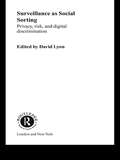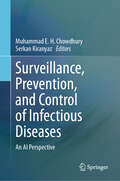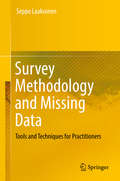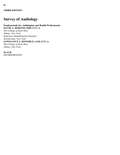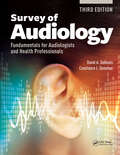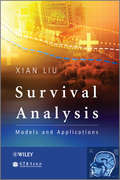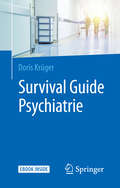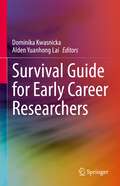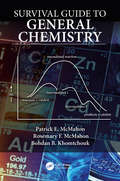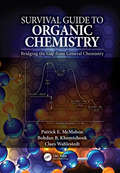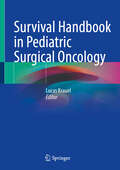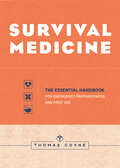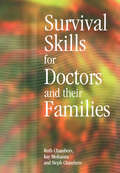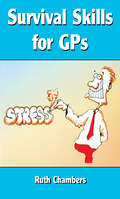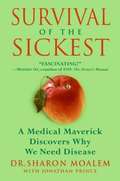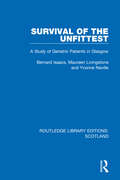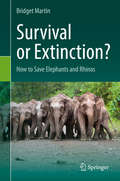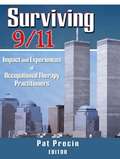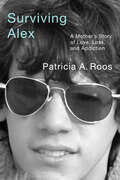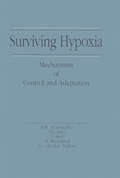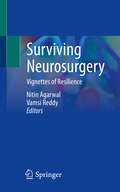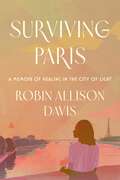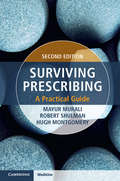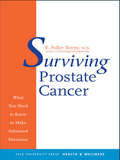- Table View
- List View
Surveillance as Social Sorting: Privacy, Risk and Automated Discrimination
by David LyonSurveillance happens to all of us, everyday, as we walk beneath street cameras, swipe cards, surf the net. Agencies are using increasingly sophisticated computer systems - especially searchable databases - to keep tabs on us at home, work and play. Once the word surveillance was reserved for police activities and intelligence gathering, now it is an unavoidable feature of everyday life.Surveillance as Social Sorting proposes that surveillance is not simply a contemporary threat to individual freedom, but that, more insidiously, it is a powerful means of creating and reinforcing long-term social differences. As practiced today, it is actually a form of social sorting - a means of verifying identities but also of assessing risks and assigning worth. Questions of how categories are constructed therefore become significant ethical and political questions.Bringing together contributions from North America and Europe, Surveillance as Social Sorting offers an innovative approach to the interaction between societies and their technologies. It looks at a number of examples in depth and will be an appropriate source of reference for a wide variety of courses.
Surveillance, Prevention, and Control of Infectious Diseases: An AI Perspective
by Serkan Kiranyaz Muhammad E. H. ChowdhuryThis is a pioneering book that delves into the intersection of artificial intelligence (AI) and healthcare, specifically focusing on the detection and prevention of infectious diseases. Authored by leading experts in the field, this book offers a comprehensive overview of the latest advancements, challenges, and applications of AI in combating infectious diseases. With a unique emphasis on big data, wearable data, and computer vision, the book presents original research works that showcase innovative approaches to leveraging AI for disease surveillance, screening, and severity stratification. Through a combination of review chapters summarizing the current state of the field and novel applications of AI technology, readers gain valuable insights into the potential of AI in addressing major life-threatening infectious diseases identified by the UN Sustainable Development Goal 3. The book's structure ensures a balanced blend of theoretical foundations and practical applications, making it accessible to both researchers and healthcare professionals. By exploring cutting-edge methodologies and case studies, the book equips readers with the knowledge and tools needed to harness the power of AI in the fight against infectious diseases, ultimately contributing to global efforts to improve public health outcomes. With its interdisciplinary approach and focus on AI-driven solutions, " Surveillance, prevention, and control of infectious diseases: An AI perspective" serves as an invaluable resource for researchers, practitioners, and policymakers seeking to stay abreast of the latest developments in this rapidly evolving field. Whether exploring the role of wearable devices in disease monitoring or examining the potential of computer vision for early detection, this book offers a comprehensive overview of AI applications that have the potential to revolutionize infectious disease management and prevention strategies.
Survey Methodology and Missing Data: Tools and Techniques for Practitioners
by Seppo LaaksonenThis book focuses on quantitative survey methodology, data collection and cleaning methods. Providing starting tools for using and analyzing a file once a survey has been conducted, it addresses fields as diverse as advanced weighting, editing, and imputation, which are not well-covered in corresponding survey books. Moreover, it presents numerous empirical examples from the author's extensive research experience, particularly real data sets from multinational surveys.
Survey of Audiology: Fundamentals for Audiologists and Health Professionals
by David A. DeBonis Constance L. DonohueIn Survey of Audiology: Fundamentals for Audiologists and Health Professionals, Third Edition, updates have been made to include the latest information on cognition and hearing loss, pharmacology, central auditory processing disorders, wireless technology, hearing aid accessibility, tinnitus, genetics and biotechnology, and noise exposure.
Survey of Audiology: Fundamentals for Audiologists and Health Professionals, Third Edition
by David DeBonis Constance DonohueFor nearly 20 years, Survey of Audiology: Fundamentals for Audiologists and Health Professionals has provided both the breadth of an introductory survey of audiology and the depth of a detailed textbook. Inside, Drs. David DeBonis and Constance Donohue have combined their years of work in clinical settings and their experience teaching audiology into a textbook intended to give students all the knowledge they’ll need in the most accessible and comprehensible format.In this Third Edition, updates have been made to include the latest information on the most current topics in audiology, including cognition and hearing loss, pharmacology, central auditory processing disorders, wireless technology, hearing aid accessibility, tinnitus, genetics and biotechnology, and noise exposure.New and updated inside the Third Edition: Ethical considerations for audiologists Auditory Neuropathy Spectrum Disorder (ANSD) Auditory processing disorders Tinnitus Evidence-based genetic counseling The latest hearing aid technology How to critically review evidence in literature and studies Included with the text are online supplemental materials for faculty use in the classroom.With its extensive glossary, numerous case examples, chapter abstracts, learning objectives, and questions for discussion, Survey of Audiology is designed to support learning and reinforce key points in every way. The text also works to integrate the humanistic aspects of audiology with the scientific ones into holistic discussions of assessment and intervention. Through this approach, students will learn to always remember that there is a person behind each set of symptoms.While aspiring audiologists will appreciate the depth of Survey of Audiology: Fundamentals for Audiologists and Health Professionals, Third Edition, students of speech-language pathology and other health professions looking for a crash course in audiology will benefit from its readability and wide scope.
Survival Analysis
by Xian LiuSurvival analysis concerns sequential occurrences of events governed by probabilistic laws. Recent decades have witnessed many applications of survival analysis in various disciplines. This book introduces both classic survival models and theories along with newly developed techniques. Readers will learn how to perform analysis of survival data by following numerous empirical illustrations in SAS.Survival Analysis: Models and Applications: Presents basic techniques before leading onto some of the most advanced topics in survival analysis.Assumes only a minimal knowledge of SAS whilst enabling more experienced users to learn new techniques of data input and manipulation.Provides numerous examples of SAS code to illustrate each of the methods, along with step-by-step instructions to perform each technique.Highlights the strengths and limitations of each technique covered.Covering a wide scope of survival techniques and methods, from the introductory to the advanced, this book can be used as a useful reference book for planners, researchers, and professors who are working in settings involving various lifetime events. Scientists interested in survival analysis should find it a useful guidebook for the incorporation of survival data and methods into their projects.
Survival Guide Psychiatrie
by Doris KrügerDas Buch führt praxisorientiert und konsequent den Assistenzart durch die Hindernisse im ersten Jahr der Psychiatrie. Es beantwortet zahlreiche organisatorische Fragen und ist der Rote Faden, der Anfängern zu Beginn ihrer Berufszeit die Unsicherheit nehmen soll.
Survival Guide for Early Career Researchers
by Dominika Kwasnicka Alden Yuanhong LaiNavigating research careers is often highly challenging for early career researchers (ECRs) in the social sciences. The ability to thrive in research careers is complex and requires "soft" people and management skills and resilience that often cannot be formally taught through university coursework. Written from a peer perspective, this book provides guidance and establishes emotional rapport on topical issues relevant for ECRs in academia and industry. The authors are ECRs who have been successful in navigating their careers, and they seek to connect with readers in a supportive and collegial manner. Each chapter includes elements of story-telling and scientific thinking and is organized into three parts: (1) a personal story that is relevant to the topic; (2) key content on professional and personal effectiveness based on evidence in the psychological, sociological, and/or management sciences; and (3) action points and practical recommendations. The topics covered are specifically curated for people considering undertaking research careers or already working in research, including:Work Hard, Snore Hard: Recovery from Work for Early Career ResearchersNetworking and Collaborating in Academia: Increasing Your Scientific Impact and Having Fun in the ProcessAccelerating Your Research Career with Open ScienceEngaging with the Press and MediaMake Your Science Go Viral: How to Maximize the Impact of Your ResearchExploring the Horizon: Navigating Research Careers Outside of AcademiaThinking like an Implementation Scientist and Applying Your Research in PracticeSurvival Guide for Early Career Researchers summarizes relevant evidence-based research to offer advice in strategic but also supportive ways to ECRs. It is an essential go-to practical resource for PhD students, postdoctoral fellows, and junior faculty. This book will also benefit senior researchers who are serving as mentors or delivering professional development programs, administrators and educators in institutions of higher learning, and anyone with an interest in building a successful research career.
Survival Guide to Dating Your Boss
by Fiona McarthurIts their last summer of being single! Off duty, these three nurses, and one midwife, are young, free and fabulous for the moment Cort Mason Dr Delectable Rubys Diary: However much I might not be loving my rotation in A&E, there is one perk that makes my job more fun Flirting with Senior Registrar Cort Mason is definitely a distraction, but a moonlit walk on the beach cant be a good idea and as for kissing him? Well, thats deliciously dangerous! Survival Guide to Dating Your BossTillys Diary: At loggerheads with my new boss we dont agree on anything except the sizzling attraction between us. Must encourage colleagues not to nudge and wink every time they see the two of us together in the hospital corridor. Roll on tomorrow. Another day spent pretending I havent fallen for Dr Marcus Bennett
Survival Guide to General Chemistry: Bridging The Gap From General Chemistry
by Patrick E. McMahon Rosemary McMahon Bohdan KhomtchoukThis work evolved over thirty combined years of teaching general chemistry to a variety of student demographics. The focus is not to recap or review the theoretical concepts well described in the available texts.Instead, the topics and descriptions in this book make available specific, detailed step-by-step methods and procedures for solving the major types of problems in general chemistry. Explanations, instructional process sequences, solved examples and completely solved practice problems are greatly expanded, containing significantly more detail than can usually be devoted to in a comprehensive text. Many chapters also provide alternative viewpoints as an aid to understanding. Key Features: The authors have included every major topic in the first semester of general chemistry and most major topics from the second semester. Each is written in a specific and detailed step-by-step process for problem solving, whether mathematical or conceptual Each topic has greatly expanded examples and solved practice problems containing significantly more detail than found in comprehensive texts Includes a chapter designed to eliminate confusion concerning acid/base reactions which often persists through working with acid/base equilibrium Many chapters provide alternative viewpoints as an aid to understanding This book addresses a very real need for a large number of incoming freshman in STEM fields
Survival Guide to Organic Chemistry: Bridging the Gap from General Chemistry
by Bohdan B. Khomtchouk Claes Wahlestedt Patrick E. McMahonThe Survival Guide to Organic Chemistry: Bridging the Gap from General Chemistry enables organic chemistry students to bridge the gap between general chemistry and organic chemistry. It makes sense of the myriad of in-depth concepts of organic chemistry, without overwhelming them in the necessary detail often given in a complete organic chemistry text. Here, the topics covered span the entire standard organic chemistry curriculum. The authors describe subjects which require further explanation, offer alternate viewpoints for understanding and provide hands-on practical problems and solutions to help master the material. This text ultimately allows students to apply key ideas from their general chemistry curriculum to key concepts in organic chemistry.
Survival Handbook in Pediatric Surgical Oncology
by Lucas KrauelDespite the advances in precision medicine and the progressive tailoring of multimodal therapies, surgery still remains the mainstay treatment in the majority of pediatric solid tumors and plays a key role in the multidisciplinary evaluation and management of pediatric oncology patients. The surgeons will face a variety of challenging situations in many aspects of the treatment of a child with cancer. Whether in the emergency department, evaluating a new patient or in the operating room, a clear and concise decision-making plan needs to be developed to assure optimal care and survival. The Survival Handbook in Pediatric Surgical Oncology is to provide an up-to-dated, portable, easy to read and schematic overview of the main topics of the surgeon's role in pediatric oncology, delivering a quick reference guide especially designed for pediatric surgery residents, fellows and young practitioners. The wide coverage of general aspects of the field, like epidemiology, basic oncology, anesthesia and imaging, will be completed with a detailed but brief analysis of most prevalent solid tumors. Other important topics will also be treated, like oncological emergencies and fertility considerations. The chapters will be in charge of key opinion leaders in every topic, looking to deliver only the crucial information, in order to help in the bedside decision making plan. This handbook will be an important partner for many pediatric surgeons around the world, because in this kind of disease it’s crucial to act quickly and correctly in order to assure the right diagnosis and start treatment as soon as possible.
Survival Medicine: The Essential Handbook for Emergency Preparedness and First Aid
by Thomas CoyneA how-to survival guide for when disaster strikes When an emergency occurs and help is far away, you want to be prepared to care for yourself and your loved ones. With this practical survival medicine handbook, you'll have the skills you need to spring into life-saving action. You'll find out how to prepare for and respond to emergencies when medical help and supplies are not available and keep your family safe in the aftermath of earthquakes, fires, and other disasters. This essential survival medicine handbook helps you: Recognize and diagnose—Learn to identify and assess the severity of medical emergencies, including how to perform a head-to-toe trauma exam and assess a person's vital signs. Learn medical fundamentals—This survival medicine handbook breaks down basic treatment for common injuries and illnesses and offers a reference for more advanced techniques like CPR. Plan for short or long term—Meet both immediate and long-term survival needs with the help of handy checklists for your home and vehicle, along with critical insights to prepare you for specific scenarios. When disaster strikes, this easy-to-use survival medicine handbook is the helping hand you need.
Survival Skills for Doctors and their Families
by Kay Mohanna Ruth Chambers Steph ChambersSo what's so special about doctors and their families? Many doctors feel that they are expected to give too much of their time to a medical career to the detriment of their family and their personal lives. This book is a practical guide to provide support and ideas on how to cope with stresses directly suffered or passed on from a relative or spouse. Written in a clear and practical style, using information collated from family members describing their feelings about having a doctor in the family, it provides unique and vital information on how to minimise the effects of having a medical career on the family. Essential reading for doctors, and their families.
Survival Skills for GPs
by Ruth ChambersSurvival Skills for GPs is an in-depth interactive personal coaching course that: Shows how you can survive the rigours of general practice, teaches you how to stay in control of your professional life, helps you learn to enjoy your career as a GP again, gives you the confidence and skills to develop your career. The first personal coaching course for GPs presented as an interactive workbook, which allows individual GPs, to progress from any stress in their lives through to job satisfaction and career development. It is applicable to all areas of life and shows comparisons to how other GPs' are doing.
Survival of the Sickest
by Jonathan Prince Sharon MoalemRead it. You're already living it. Was diabetes evolution's response to the last Ice Age? Did a deadly genetic disease help our ancestors survive the bubonic plagues of Europe? Will a visit to the tanning salon help lower your cholesterol? Why do we age? Why are some people immune to HIV? Can your genes be turned on -- or off? Joining the ranks of modern myth busters, Dr. Sharon Moalem turns our current understanding of illness on its head and challenges us to fundamentally change the way we think about our bodies, our health, and our relationship to just about every other living thing on earth, from plants and animals to insects and bacteria. Through a fresh and engaging examination of our evolutionary history, Dr. Moalem reveals how many of the conditions that are diseases today actually gave our ancestors a leg up in the survival sweepstakes. When the option is a long life with a disease or a short one without it, evolution opts for disease almost every time. Everything from the climate our ancestors lived in to the crops they planted and ate to their beverage of choice can be seen in our genetic inheritance. But Survival of the Sickest doesn't stop there. It goes on to demonstrate just how little modern medicine really understands about human health, and offers a new way of thinking that can help all of us live longer, healthier lives. Survival of the Sickest is filled with fascinating insights and cutting-edge research, presented in a way that is both accessible and utterly absorbing. This is a book about the interconnectedness of all life on earth -- and, especially, what that means for us.
Survival of the Unfittest: A Study of Geriatric Patients in Glasgow (Routledge Library Editions: Scotland #13)
by Bernard Isaacs Maureen Livingstone Yvonne NevilleOriginally published in 1972, this book is an analytical account of the socio-medical tribulations suffered by Glasgow’s east-end elderly leading to referral to geriatric wards. It examines why so many old people suffer from physical, mental and social deprivation in the final years of their lives. It shows by statistical studies and illustrative case histories that the basic cause is the survival into old age of people who are unfit to care for themselves, in such numbers that help from families, neighbours, the social services and the NHS is insufficient. From this study the expression the "geriatric giants" or the four I’s was coined: impairment of intellect (cerebral dysfunction), incontinence, immobility and instability (falls). The term ‘giant’ is seen to refer both to statistical frequency and to the huge personal burden of sufferers, escalating the need for socio-medical intervention. Prophetic in its predictions that the huge and complex social care problem would grow in the future much of this book remains relevant today.
Survival or Extinction?: How to Save Elephants and Rhinos
by Bridget MartinWritten with passion for anyone interested in seeing an end to the illegal trade in elephant ivory and rhino horn, this book shows how, by working together, people all over the world who care about these animals are gradually bringing about change for the better. It takes an overview of how the current situation came to pass by exploring poaching and its devastating consequences and the pivotal role of organized crime. The discussion of how matters are starting to improve covers the investigation and monitoring of ivory markets, sustainable uses and the key role of local communities.Enforcement of the law is vital in this story. Enter the enforcers, the technology they use to defeat the poachers and the evidence they require to prosecute offenders. Cases, some deeply shocking, are included, as well as a number of fascinating case studies, while the exploits of organized crime gangs make lively, as well as disturbing reading. Throughout the message is clear. We can and must save these animals from extinction.
Surviving 9/11: Impact and Experiences of Occupational Therapy Practitioners
by Pat PrecinThe first in-depth look of the effects of September 11 on occupational therapy! Surviving 9/11: Impact and Experiences of Occupational Therapy Practitioners is a collection of firsthand accounts from occupational therapy providers and their clients. This book reveals the thoughts and fears of occupational therapists who had to help heal their patients while suffering emotional and psychological stress themselves. This volume shows how occupational therapy practitioners dealt with the aftermath using group discussions, planned events, and creative projects to heal themselves as well as their clients. Surviving 9/11 demonstrates the importance of therapeutic treatment for all types of victims of the attacks, from survivors to television observers. It discusses how distinct each client&’s needs are-from the survivor in the hospital bed to the firefighter endlessly searching for his lost brothers. This book will also show you the importance of changing therapeutic styles during the lengthy coping process to adapt to the changing needs of the client. This enlightening text is divided into three parts: September 11th Day One-personal and professional accounts of the day of the disaster from occupational therapists in and around the city and around the world-with a special narrative from a 9/11 survivor who received occupational therapy Ground Zero Milieu-the experiences in and around Ground Zero following the attack, including occupational therapists at the rescue and recovery site, the Federal Emergency Management Agency&’s (FEMA) Project Liberty program, and the development of the Downtown Therapists Assistance Project to help occupational and physical therapists whose businesses were irrecoverable after September 11 Spirituality-the new challenges to occupational therapy in mental health in dealing with post-traumatic stress disorder and panic disorder-throughout the general population and in the mental health community Surviving 9/11 is a unique blend of personal and professional perspectives designed to help you get in touch with your feelings and thoughts about what happened on September 11. More importantly, this easy-to-read book can help you prepare for future disasters, whether you are a healthcare professional, a disabled person, a survivor, or someone who is otherwise affected. With illustrations, memorial designs, and photos of the tragedy and its aftermath, this book is a must-read in this age of uncertainty.
Surviving Alex: A Mother’s Story of Love, Loss, and Addiction
by Patricia A. RoosIn 2015, Patricia Roos’s twenty-five-year-old son Alex died of a heroin overdose. Turning her grief into action, Roos, a professor of sociology at Rutgers University, began to research the social factors and institutional failures that contributed to his death. Surviving Alex tells her moving story—and outlines the possibilities of a more compassionate and effective approach to addiction treatment. Weaving together a personal narrative and a sociological perspective, Surviving Alex movingly describes how even children from “good families” fall prey to addiction, and recounts the hellish toll it takes on families. Drawing from interviews with Alex’s friends, family members, therapists, teachers, and police officers—as well as files from his stays in hospitals, rehab facilities, and jails—Roos paints a compelling portrait of a young man whose life veered between happiness, anxiety, success, and despair. And as she explores how a punitive system failed her son, she calls for a community of action that would improve care for substance users and reduce addiction, realigning public health policy to address the overdose crisis.
Surviving Hypoxia: Mechanisms of Control and Adaptation
by Peter L. Lutz Peter W. Hochachka Thomas J. Sick Myron RosenthalSurviving Hypoxia: Mechanisms of Control and Adaptation is a synthesis of findings and thoughts concerning hypoxia. The thermodynamics of hypoxia are discussed in detail, including acid-base balance and self-pollution resulting from the accumulation of anaerobic end-products. The book focuses on descriptions and discussions of common facets, contrasting solutions in a variety of physiological hypoxia defense strategies, including those shown by plants, invertebrates, and vertebrates. Special treatment is given to the distinctive problems that hypoxia presents to vulnerable organs such as the kidney, liver, and brain. It also addresses pathological events in addition to protective mechanisms. Clinical implications of basic research are examined in the book, which provides new insights into underlying pathological processes occuring in hypoxic-induced organ failure and indicates new paths for successful clinical intervention. Surviving Hypoxia: Mechanisms of Control and Adaptation is an excellent reference for all researchers interested in the physiological effects of hypoxia, underlying pathological events, and protective mechanisms.
Surviving Neurosurgery: Vignettes of Resilience
by Nitin Agarwal Vamsi ReddySurviving Neurosurgery: Vignettes of Resilience is a practical guide to the inner workings of the lives of neurosurgeons, healthcare partners, and patients. To this end, this text serves as a first-hand documentary of the unique challenges faced as one progresses through their career. It is a snapshot in time capturing the experiences of both patients and providers. The text is divided into seven parts that run the gamut of a neurosurgeon’s career symbolic of the seven years of neurosurgical training. These narratives include, but are not limited to, residency challenges, surgical nuances, research and funding, embracing humanity, patient experiences, and overcoming hurdles along the journey. Chapters share the wisdom and experiences of over 100 authors consisting of patients, trainees, advanced practice providers, and attending neurosurgeons.
Surviving Paris: A Memoir of Healing in the City of Light
by Robin Allison DavisA deeply personal account of a young Black woman who set out to shake up her life by moving abroad but got a lot more than she bargained for. Surviving Paris is not Emily in Paris. It’s not a story of moving to the City of Light, meeting a dashing Frenchman, and raising beret-wearing enfants. It is not a romantic fantasy. It is a true story about a young, Black single woman and what happens when your Paris dream turns into a Paris nightmare.After more than a decade as a journalist and television producer, Robin Allison Davis decided to shake up her life and move to France. But it wasn’t quite the life she expected. When she was just thirty-four, she was diagnosed with breast cancer. Surviving Paris recounts her journey from diagnosis through multiple surgeries to surviving the strictest Covid-19 lockdowns, only to be told her cancer had come back—and how she got to finding herself healthy again, including all the detours in between.While this book is about cancer, it’s not just about survival. It's a love story about cancer. It's a story about Robin's love of adventure, her love of love, and her love for herself. Grounded yet irreverent, informative and anecdotal, Surviving Paris has laughter, sorrow, and some unforgettable cringe-worthy moments. It also has courage, surprises, and remarkable depths of heart.Robin writes about the struggles of finding her community and family away from home, dating on Tinder with one boob, and learning to be the best advocate for her medical care in a culture she doesn't completely understand, and that doesn’t understand her. Surviving Paris details the good, the bad, and the ugly of expatriating to Paris and one American woman’s unexpected and often hilarious journey—and her precious second chance at life.
Surviving Prescribing: A Practical Guide
by Hugh Montgomery Robert Shulman Mayur MuraliSafe and effective prescribing is one of the pillars of medical practice but is much more complicated than it seems. Many new prescribers find prescribing extremely challenging, and a plethora of independent, multidisciplinary prescribers are also seeking guidance. However, pharmacology textbooks are rarely practical. They warn to 'take care when prescribing erythromycin to a patient on warfarin, as the INR may rise'. But what should the prescriber actually do? Surviving Prescribing fulfils an important need by offering practical advice for real-world prescribing problems. The book complements existing educational resources but adds a new perspective. Written by experienced contributors from a variety of professional backgrounds, the content speaks directly to the problems routinely seen in hospital prescribing. And all in one, pocket-sized volume. Whether revising for the national Prescribing Safety Assessment, preparing for starting on the wards, or looking for a quick reference guide, this book is an essential companion.
Surviving Prostate Cancer
by E. Fuller TorreyWhen Dr. E. Fuller Torrey was diagnosed with prostate cancer, none of the books he could find was current enough or comprehensive enough to satisfy his need for information. This book is for the hundreds of thousands of other men who each year receive the same frightening diagnosis. It is the book Dr. Torrey wished he had when he was facing the countless questions that a man with prostate cancer, and his family and friends, all confront. Complete, up-to-date, and readable, the book explains how to come to terms with the diagnosis of prostate cancer, evaluate the severity of the disease, and assess the variety of treatment options and their complications. Many chapters provide information other books barely consider, such as a full discussion of the causes of prostate cancer and an evaluation of other books on the subject. Also included is a summary of the most useful Web sites. The author mixes his personal experience with factual material, and he maintains a reassuring sense of humor. His advice is practical, with dozens of tips and lists including "Ten Steps to Sanity for Men Recently Diagnosed with Prostate Cancer." With Dr. Torrey's book in hand, readers can now tackle all the important decisions about prostate cancer, confident in having the most accurate and complete information available.
